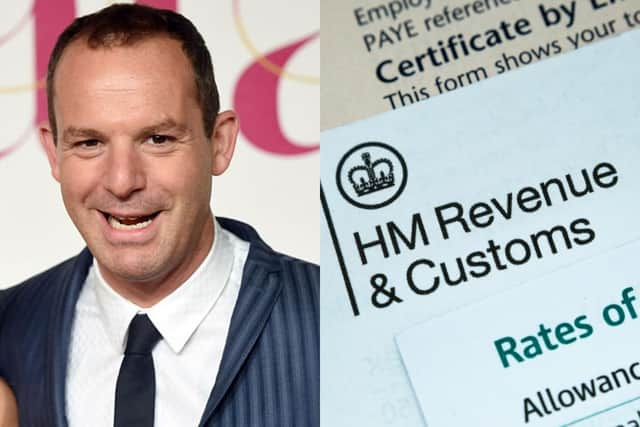Martin Lewis: Money Saving Expert says millions of UK couples could claim up to £1,000 in tax breaks - here’s how
This article contains affiliate links. We may earn a small commission on items purchased through this article, but that does not affect our editorial judgement.
and live on Freeview channel 276
Money Saving Expert Martin Lewis has revealed that millions of couples in the UK could be owed up to £1,000 from the Government thanks to something called Marriage Allowance.
Speaking on The Martin Lewis Money Show Live, Lewis explained: “If you are a married couple or in a civil partnership - not common law, just living together doesn’t count - and one of you is a non-taxpayer, the other is a basic 20 per cent rate taxpayer, then this person can give 10 per cent of their tax free allowance to the other person.
Advertisement
Hide AdAdvertisement
Hide Ad“You apply online at gov.uk and it’s worth about £250 this year, but you can go back four years. The past years are done by cheque, this year is done by tax code change. It’s very lucrative, there are over one million people who aren’t claiming it.”


This is what you need to know.
How does Marriage Allowance work?
The Government explains that Marriage Allowance lets you transfer £1,260 of your Personal Allowance to your husband, wife or civil partner.
This then reduces their tax by up to £252 in the tax year (6 April to 5 April the next year).
To benefit as a couple, the lower earner must normally have an income below your Personal Allowance, which is usually £12,570.
Advertisement
Hide AdAdvertisement
Hide AdYou can use the calculator on the Government website to calculate how much tax you, as a couple, could save.
You should call the Income Tax helpline if you receive other income such as dividends, savings or benefits from your job - you can also get in touch with them if you do not know what your taxable income is.
When you transfer some of your Personal Allowance to your spouse or civil partner, you might have to pay more tax yourself, but could still pay less overall as a couple.
Can I see an example?
This is the example that the Government gives: “Your income is £11,500 and your Personal Allowance is £12,570, so you do not pay tax.
Advertisement
Hide AdAdvertisement
Hide Ad“Your partner’s income is £20,000 and their Personal Allowance is £12,570, so they pay tax on £7,430 (their ‘taxable income’). This means as a couple you are paying Income Tax on £7,430.
“When you claim Marriage Allowance you transfer £1,260 of your Personal Allowance to your partner. Your Personal Allowance becomes £11,310 and your partner gets a ‘tax credit’ on £1,260 of their taxable income.
“This means you will now pay tax on £190, but your partner will only pay tax on £6,170. As a couple you benefit, as you are only paying Income Tax on £6,360 rather than £7,430, which saves you £214 in tax.”
We want to hear from you: let us know what you think about this story and be part of the debate in our comments section below
Who can apply for Marriage Allowance?
Advertisement
Hide AdAdvertisement
Hide AdYou can benefit from Marriage Allowance if the following apply to you:
- You’re married or in a civil partnership
- You do not pay Income Tax or your income is below your Personal Allowance (usually £12,570)
- Your partner pays Income Tax at the basic rate, which usually means their income is between £12,571 and $50,070 before they receive Marriage Allowance
You cannot claim Marriage Allowance if you’re living together, but not married in a civil partnership.
Advertisement
Hide AdAdvertisement
Hide AdIf you and your partner live in Scotland, your partner must pay the starter, basic or intermediate rate, which usually means their income is between £12,651 and £43,662.
Your application for Marriage Allowance will not be affected if you or your partner:
- Are currently receiving a pension
- Live abroad - as long as you get a Personal Allowance
If you or your partner were born before 6 April 1935, you may benefit from Married Couple’s Allowance instead.
Can I backdate my claim?
You are able to backdate your claim to include any tax year since 5 April 2017 that you were eligible for Marriage Allowance.
Advertisement
Hide AdAdvertisement
Hide AdYour partner’s tax bill will be reduced depending on the Personal Allowance rate for the years you’re backdating.
If you’re backdating your claim, you will get your payment either via bank transfer or cheque.
How do I apply?
You can apply for Marriage Allowance via the Government website - before you apply, you’ll need your and your partner’s National Insurance numbers.
You also need to prove your identity using any two of the following:
- Your P60
- One of your three most recent payslips
- Your UK passport details
Advertisement
Hide AdAdvertisement
Hide Ad- Information held on your credit file, such as loans, credit cards or mortgages
- Details from your Self Assessment tax return in the last three years
A message from the editor:
Thank you for reading. NationalWorld is a new national news brand, produced by a team of journalists, editors, video producers and designers who live and work across the UK. Find out more about who’s who in the team, and our editorial values. We want to start a community among our readers, so please follow us on Facebook, Twitter and Instagram, and keep the conversation going.
Comment Guidelines
National World encourages reader discussion on our stories. User feedback, insights and back-and-forth exchanges add a rich layer of context to reporting. Please review our Community Guidelines before commenting.
